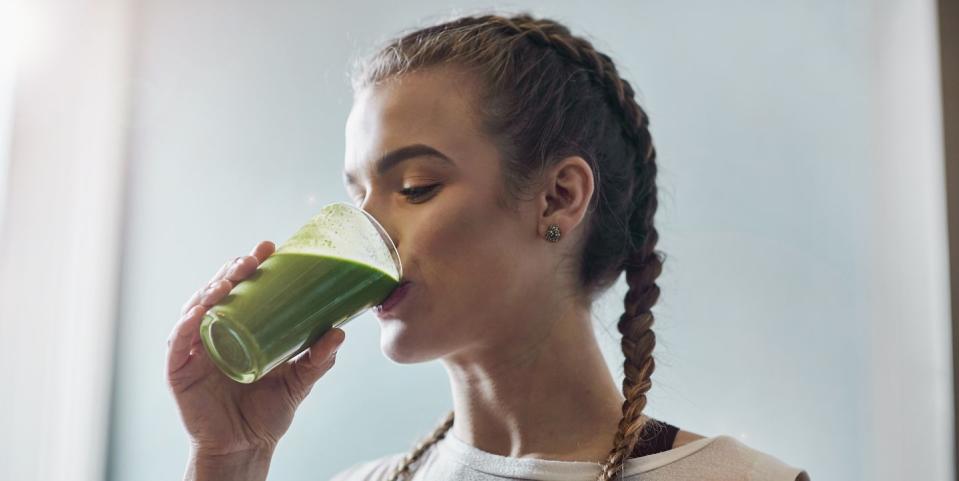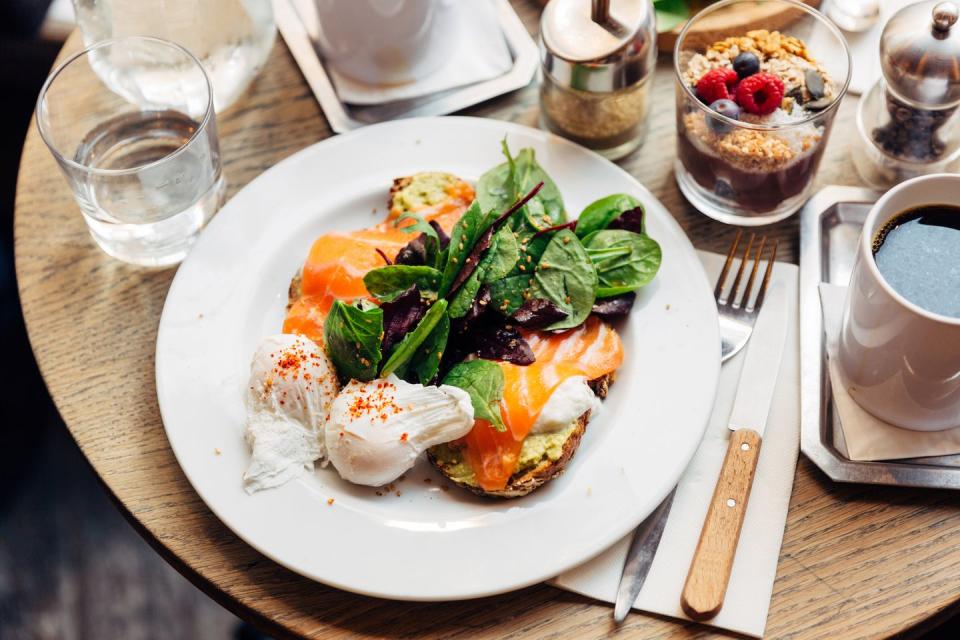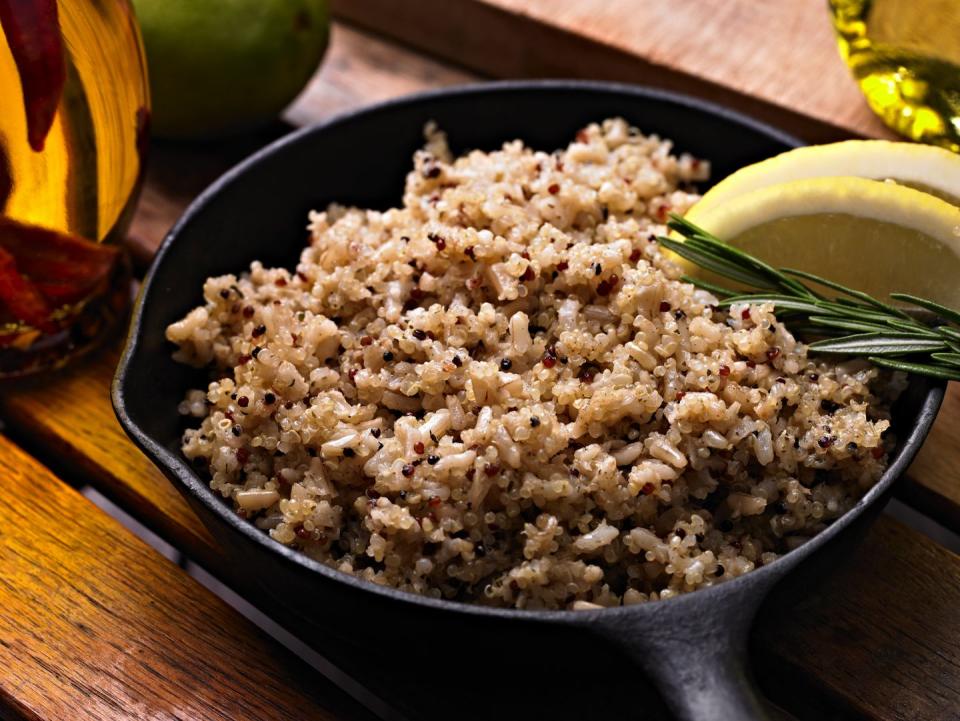14 Healthy Foods To Buy On Your Next Supermarket Trip For An Instant Energy Boost

When it comes to buying healthy food, we all know that getting your five a day, vitamins and antioxidants are essentially to maintaining a healthy ticker and brain.
The NHS recommends that a healthy balanced diet consists of meals based of high fibre starchy ingredients like potatoes and pasta, some dairy or diary alternatives, pulses, unsaturated oils and spreads and at least five portions of fruit and vegetables.
However, we often find that after eating certain foods, such as those high in sugar or made up of refined carbohydrates, we experience a dip in our energy levels, making hours of work, house chores and exercise all the more difficult.
‘Being busy and maintaining a healthy diet should go hand in hand, but when we get busy, priorities often shift and healthy habits can slip away,’ leading London nutritionist Lily Soutter tells ELLE UK.

This is made even worse when we’re working from home.
‘When your office and home are essentially one entity, and the kitchen is within arm’s reach, it can feel like an uphill battle when it comes to making smart eating choices,’ says Souter. ‘Inactivity and boredom eating can be a recipe for lethargy and fatigue.'
‘If you don't want to compromise a healthy diet with your busy lifestyle, then there are certain powerhouse ingredients that a quick pick-me-up that are guaranteed to recharge your body and help you to stay alert all day’.
Here is a list of the best healthy foods to add to the shopping list to raise those energy levels, according to two of the UK's leading dieticians:
1) Eggs
A post shared by Women's Health Specialist (@angeliquepanagos) on Dec 15, 2017 at 12:38am PST
For non-vegans, eggs will be a staple addition during a weekly shop that can make a variety of dishes such as omelettes, scrambles eggs and quiche.
‘By including protein at your breakfast meal you can help to keep hunger at bay,’ says Soutter. ‘Protein and a little fat can help to slow the rate at which a carbohydrate will break down into sugar, which is a perfect way of obtaining sustained energy all morning long.’
Nutritionist Angelique Panagos adds that eggs are high in iron, necessary for haemoglobin production and transporting oxygen to the rest of the body. 'Decreased oxygen levels can result in fatigue, and eggs are also rich in B12, which makes eggs are a welcomed addition to help increase your energy,' she says.
2) Oats
We all know that oats, be they soaked in almond milk with berries overnight or mixed with hot milk to make porridge, are a fantastic energy-lifter in the morning.
‘All carbohydrates break down to sugar, but it’s only the fibre rich slow-release carbohydrates such as oats, which provide sustained fuel to the body and brain,’ she says.
3) Strawberries
A post shared by Lily Soutter BSc (hons) (@lily_soutter_nutrition) on Oct 21, 2019 at 12:35am PDT
They might be an essential with cream and Pimms during Wimbledon but Soutter says that strawberries come with more vitamin C per 100g in comparison to oranges.
‘Vitamin C is essential for strengthening the immune system and combating tiredness and fatigue,’ she says.
‘Fuelling our body with nutrient-dense foods really is the key to stronger mental focus, energy and even clearer thinking,’ she continues. ‘Improved efficiency in our work life can leaving us with more time to create success in our personal life.’
4) Cherries
These are full of antioxidants, otherwise known as anthocyanins, which are responsible for their deep red or purple hue, explains Soutter.
‘Anthocyanins are currently under research for anti-inflammatory and potential heart health benefits,’ she says.
They are also a rich source of melatonin, which is a hormone that is widely believed to improve quality of sleep. However, Soutter notes that studies in relation to sleep have commonly used Montmorency tart cherry juice, so further research is needed as to cherries’ sleep benefits.
5) Salmon

If you’re in the mood for something low in carbohydrates and easy to make after a busy day at work, a salmon-based dish is the perfect answer.
‘Did you know that 60 per cent of our brain is made up of fat?’ asks Soutter. ‘Most of these fats are similar to those found in salmon called omega 3’s. These fats can play a role with supporting concentration, memory and mood.’
The healthiest way to eat salmon is to poach it and pair it with rich and healthy vegetables like green beans, lemon, garlic, broccoli and carrots.
6) Matcha green tea
If you’ve ever wonder what matcha actually is other than a green-coloured substance in smoothies, it’s essentially a finely ground powder of processed green tea leaves.
When it comes to health, Sutter explains that green tea contains a special substance called L-Theanine, which has been shown to stimulate a feeling of relaxed alertness and clarity.
‘Swapping your espresso for a cup of matcha could provide a brain and energy boost without the jitters that come with excess caffeine,’ she suggests.
Panagos adds: 'Matcha also contains high antioxidant levels which can further support the body.'
7) Water
The NHS advises people to drink plenty of fluids, approximately six to sight glasses a day.
‘Water is a healthy and cheap choice for quenching your thirst at any time. It has no calories and contains no sugars that can damage teeth,’ the organisation’s website states.
Soutter points out that dehydration can lead to fatigue, lack of concentration and reduce efficiency throughout the day so it is essential to consume fluids.
‘If you struggle with plain water, then try infusing water overnight with fresh berries, ginger, lemon or mint,’ suggests Soutter. ‘Fruit and herbal teas all count to your daily water intake.’
8) Kale
A post shared by Lily Soutter BSc (hons) (@lily_soutter_nutrition) on Sep 13, 2019 at 7:34am PDT
If Popeye was on TV today, we’re pretty sure the sailor would’ve eaten cans of kale rather than spinach given its increasing popularity.
‘Dark green leafy vegetables such a kale provide a rich source of iron,’ says Soutter. ‘Iron is an essential mineral needed for energy production. Iron deficiency is an often-missed cause of fatigue.’
You can eat kale cooked or raw, fresh and frozen.
9) Dark chocolate
If you thought chocolate was bad for you, think again as in its darkest, most high-quality form it is a healthy source of magnesium.
‘Magnesium is an important mineral required for energy production,’ says Soutter.
Dark chocolate is also a rich source of antioxidants and commonly contains less sugar than milk chocolate. Several studies have also suggested that it may help lower the risk of heart disease and improve brain function.
Check out our list of the best vegan Easter eggs here.
10) Chicken
A post shared by Lily Soutter BSc (hons) (@lily_soutter_nutrition) on Mar 29, 2020 at 2:53am PDT
‘Chicken is a fast track way of increasing our intake of B vitamins,’ says Soutter. ‘These essential vitamins convert the food we eat into energy. As they are water-soluble nutrients, they need to be replaced within the diet on a regular basis.’
The healthiest way to cook chicken is to bake (without additional fats), boil or grill it.
11) Honey
An instant source of energy, honey is a thick sweet liquid made by honeybees that is great alternative to other forms of sugar.
‘Our brain and body runs on sugar to function, and honey provides an easy to use, fast release energy fuel,’ says Soutter.
However, while you might want to add spoonfuls of the golden stuff to your porridge, smoothies and on toast in the morning be warned that it is high in sugar so Panagos advises not relying on it as your go-to energy boost food.
12) Brown rice

Panagos says that with food shortages and lack of delivery slots to get food delivered right now, we may not be having the most balanced meals at the moment.
'While we are not looking for a "perfect" meal, we want to aim for as much whole foods and fresh foods as we can, to help support the body overall, including our immune system and energy metabolism,' she suggests.
A highly nutritious food that is low in calories, brown rice is a fibre-rich accompaniment to any meal.
‘It has its outer bran layer left intact providing a source of B vitamins and magnesium, both of which are essential for energy production,’ says Soutter. ‘Rice is classified as complex carbohydrate and provides a steady release of energy to the body and brain.’
13) Mushrooms
Porcini, shiitake, portobello. There’s a wide variety of mushrooms out there on the market and, better yet, they’re incredibly good for you.
‘Sun-ripened mushrooms are one of the few vegan food sources of vitamin D, and deficiencies in this critical nutrient have been associated with fatigue,’ notes Soutter. ‘They are also a source of copper, magnesium, zinc, and B vitamins such as folate all of which are needed for optimal wellbeing and energy.’
14) Bananas
A post shared by Women's Health Specialist (@angeliquepanagos) on Jul 25, 2017 at 5:15am PDT
A source of vitamins and minerals, especially potassium and vitamin C, bananas area a great food to find that extra bit of energy you need to complete the day.
'Naturally sweet and full of fibre, bananas make a good sugar substitute and also contain B6 which facilitates converting food into energy,' says Panagos.
Like this article? Sign up to our newsletter to get more articles like this delivered straight to your inbox.
In need of more inspiration, thoughtful journalism and at-home beauty tips? Subscribe to ELLE's print magazine now and pay just £6 for 6 issues. SUBSCRIBE HERE
You Might Also Like

 Yahoo News
Yahoo News 